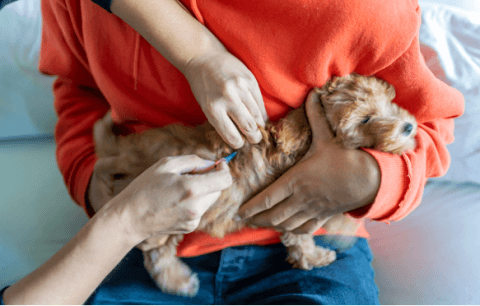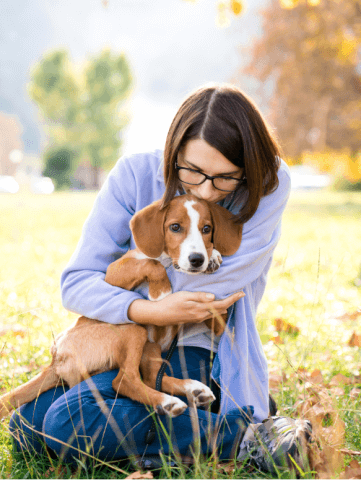Types of puppy vaccinations
There are different types of vaccines for puppies and dogs. For example, core dog vaccines, also known as C3 vaccines, are injectable vaccines, whereas canine cough vaccines are often given orally or intranasally.




Vaccines are available for several important infectious diseases in puppies and dogs:
There are different types of vaccines for puppies and dogs. For example, core dog vaccines, also known as C3 vaccines, are injectable vaccines, whereas canine cough vaccines are often given orally or intranasally.



Very young puppies are usually temporarily protected against the important infectious diseases by antibodies received through their mother’s milk. They should then receive a course of vaccinations (usually starting from 6 weeks of age). Your vet will adapt the vaccination program according to your pup’s lifestyle and local disease conditions.
Some people may think that if they have their pet vaccinated when they are puppies, the immunity they receive will protect them for the rest of their lives. Unfortunately, this is not the case. To maintain protection, regular booster vaccinations of adult dogs are required. Re-vaccination stimulates the immune response so that protection is offered for an additional period. Without these regular vaccinations, your dog’s immune system may not provide the level of protection needed to keep your dog healthy. Booster vaccinations will be recommended by your veterinarian and will ensure your dog remains protected, whatever its age.
CAN-0042-2023
When are puppy vaccinations done?
The puppy vaccination course typically starts from 6-8 weeks of age. Puppies will then receive a course of vaccinations. Your vet will advise you on the most appropriate vaccination schedule for your individual puppy.
How many vaccinations do puppies need?
Puppies require a course of vaccinations to be fully immunised. Your veterinary clinic will advise you on the number of doses required according to your pup’s lifestyle and local disease conditions.
How long after the 2nd puppy vaccination can they go out?
The safe time to start taking your puppy to public areas and to allow socialisation with other dogs will depend on the type of vaccines they have received and their age. Your veterinary clinic can advise you on when it is safe for your puppy to go out and start socialising.
How much are puppy vaccinations?
The cost of a puppy vaccination course will depend on the type and number of vaccines that your puppy requires according to their lifestyle and local disease conditions. To find out more about how much puppy vaccinations cost, please contact your veterinary clinic.
Copyright and Trademark Notice
NEXGARD SPECTRA®, NEXGARD®, HEARTGARD30® and PARAGARD® are registered trademarks of the Boehringer Ingelheim Group.
©2021-2023 Boehringer Ingelheim Animal Health Australia Pty. Ltd. All rights reserved. PET-0228-2022 PET-0203-2023